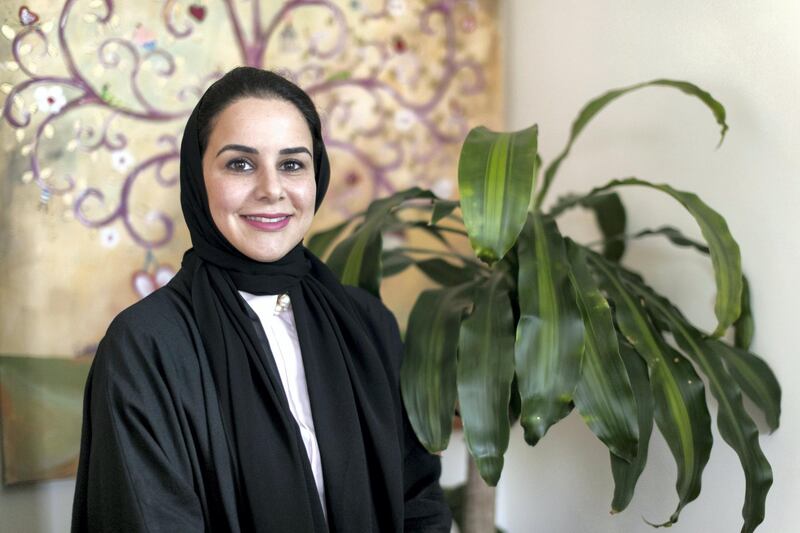Reem Al Fahim has had a passion for working with people with disabilities ever since she volunteered for an after-school club as a teenager, an experience she describes as "humbling".
Today, the 36-year-old Emirati is the chief executive of the Sedra Foundation (Services for Educational Development Research and Awareness), a non-profit organisation that works to include people with disabilities in all areas of UAE society, including in the workplace.
It all began when Ms Al Fahim started helping out at the Special Care Centre in Abu Dhabi as a student. For four years, she spent Thursdays reading to disabled children, playing basketball with them, or performing theatre. The centre had been run by the Indian Ladies' Association since 1989, and was funded by profits from a kindergarten school.
Her experiences led her to take a degree in psychology, followed by a master's degree in special education from Boston University.
Meanwhile, as the centre struggled for funding, the association approached her father, Mohammed Al Fahim - then the chairman of UAE family business the Al Fahim Group – for sponsorship. He put a new board together and included his daughter on the fundraising team. Ms Al Fahim is now the new centre's vice-chair.
Sedra has also grown from a full-time staff of two to eight. The role of a start-up foundation’s chief executive is “very hands-on”, Ms Al Fahim says. “It is a humbling experience and I’m so grateful to work in this field.”
According to the World Health Organisation, 15 per cent of the global population lives with a disability.
There are just under 16,000 people with disabilities registered in the UAE, of whom 62 per cent are UAE nationals, according to 2016 statistics from the Ministry of Community Development. It says some 2,000 staff work across almost 90 rehabilitation centres in the country.
In its national policy to empower people of determination (people with special needs), the Ministry states that its vision is “an integrated community, free from barriers, which empowers people of determination and guarantees their right to a dignified life”.
The 2006 UAE Disability Act also stipulates that UAE nationals with special needs have the right to work and hold public office. In Dubai - which plans to be one of the world's most disabled-friendly cities by 2020 - a 2014 law protects the rights of citizens with special needs in the emirate.
___________
Read more:
Women's advocate says females must change approach
Keeping tabs on your work wellbeing still has a way to go
Businesswoman Patricia Letayf rebuilds lives of the region’s displaced people with Five One Labs
___________
The three-year-old Sedra Foundation’s latest project is an inclusive internship programme, working as a “change agent to create an inclusive workforce”, Ms Al Fahim says. Clari Lehmkuhl, a 27-year-old South African with Down's Syndrome, is a recent intern who works with a job coach for two weeks before her apprenticeship. Ms Lehmkuhl spent a month working at the healthcare firm Roche Diagnostics in Dubai in its communications department.
While on-site, Ms Lehmkuhl fulfils daily administration tasks for the team during half of her workday. She will also present a review of staff and processes to the department at the end of her internship in what Ms Al Fahim calls a "very structured routine".
“One of our biggest realisations was that, to create an inclusive workplace, we had to change the environment of each company,” says Ms Al Fahim. That has meant allocating a full-time job coach to work with any interns for the duration of their time at a company.
Sedra has also run similar internships at Rotana Group, Fairmont Hotels and Microsoft in administrative and office roles. It works with Reed Exhibitions to give young adults with disabilities a taster of the world of conferences as ushers and hosts for a few days.
It also has eight interns working for 10 months in apprenticeships. They will graduate from this programme with an internationally recognised certificate in office administration.
“There is a gap of what comes next in terms of services after the age of 18, so we are really focusing our efforts on vocational programmes,” says Ms Al Fahim. “A person may graduate from high school and move on to an inclusive university, but a lot of students are enrolled in private special education schools, which do not go beyond 18 and, a lot of times, others are not able to complete high school.”
As well as its workforce inclusion programmes, Sedra also runs a youth talent scheme and a parents' academy, helping around 50 individuals and families in all. Most of its programmes are free, but parents are asked to sign up at volunteer.ae to pay it forward instead.
Volunteer.ae, launched this year, allows UAE residents to register to volunteer for projects as individuals or as part of groups or organisations in areas such as health, the elderly, sports or the arts, with the goal of signing up 200,000 volunteers this year.
Ms Al Fahim says everyone should sign up to volunteer.ae in the current Year of Giving. "Donating money or manpower is equally important - just do something, whatever it is," she urges. "Once you become invested, you don't leave."





